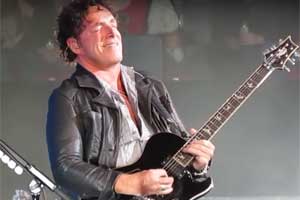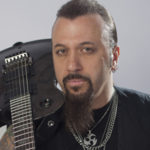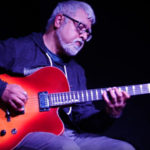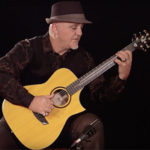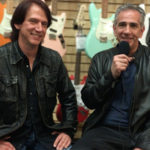Journey guitarist details his path as a Bay Area prodigy with Santana, and beyond
By Gary Graff
August 5, 2016
When you see a 15-year-old guy with a guitar now, it’s usually a pop star. When it was Neal Schon back in the late ’60s, however, he was an accomplished rocker who had studied his jazz and blues and had two bands — Santana and Derek and the Dominos — fighting for his services. The former won, and Schon became a prodigy legend who went on from Santana to form Journey in 1973, which he’s continued to pilot ever since.
Schon has maintained a steady career outside Journey, too, with nine solo albums, collaborations with Sammy Hagar, Jan Hammer and Paul Rodgers, and in other bands such as Planet Us and Soul SirkUS. He’s also credited with spearheading the reunion of the early Santana lineup that released the well-received Santana IV earlier this year.
We caught up with Schon in the midst of Journey’s traditional summer tour and took some time to get the lowdown on how he became such a hot gunslinger so early in life…
FGPO: You were a prodigy growing up in the Bay Area; not many teenagers wind up recording with national hitmakers after all. How early did you get started?
Schon: I started playing when I was 10. I was playing woodwind instruments because my dad was a teacher of woodwind instruments. I thought I was gonna play saxophone, but he gave me a clarinet, and I thought it was [an] extremely dorky instrument [laughs]. And I didn’t really care for the sound of it, either. Even though you’ll hear a really badass clarinet player, like Dixieland stuff from New Orleans that sounds really cool, for the most part it’s not a great sounding instrument to my ear. I love tenor sax or alto sax or soprano sax, I would have much more preferred to play that. But I think the mere fact that my dad was teaching me, maybe not the most patient teacher in the world. I think most of the times when your parent is teaching you something.
FGPO: So how did the guitar come into the mix?
Schon: I heard the twang of a guitar, and it was either the Beatles or the Stones, the Dave Clark Five. I heard that twang and I was like: “What is that?!” And shortly after that one of my cousins was playing in a cover band, and I went to see him when I was hanging out one night and I got inquisitive about the guitar. He showed me, like, three chords, taught me how to play “Louie, Louie” and “Gloria,” both three-chord songs. And then I went to a teacher maybe three times and learned how to tune the guitar. He showed me a few more chords, and then I was kind of off and running. I was self-taught after that, for about a year and a half, and I learned by listening to records, like everybody did — dropped the arm, pulled the arm up, slowed it down so it went down a whole octave. I guess you can do it on the computer now, a lot easier.
FGPO: How did you expand your palette beyond rock?
Schon: I started really digging the blues. I was already listening to a lot of jazz because my dad played it around the house. I was never at a loss for hearing really great music. He took me to see Count Basie when I was a kid, Duke Ellington, Ella Fitzgerald. We listened to Miles Davis a lot around the house, and then I started looking a lot into jazz guitar players. And still my favorite jazz guitarists, I have two. On the smooth side, but still progressive and amazing is Wes Montgomery — progressive, but also could play just unbelievably smooth and just whip up so much soul and tone. And then I love Charlie Christian or Larry Coryell. So I started playing more jazz at that point, and my dad hooked me up with a teacher in Palo Alto. And he started teaching me how to sight-read staff notes up and down the neck, and I got pretty good to where I was sight-reading anything he stuck in front of me. But then one day he said to me: “You know, I hear you warming up next door while I’m teaching the student before you. I gotta tell you I think you’re one of my best students. But what I’m hearing you do in the other room” — which was playing a lot of blues, and a lot of emulating voices like I loved, Aretha Franklin — “I think that’s you, man. I think that you should pursue that.” And so I took his advice and I just stopped reading altogether and stopped studying and just sort of dug into what I was hearing in my head. I followed my heart, you know, my intuition.
FGPO: So how did you get established on the scene out there?
Schon: I had a friend who took me around who was in the Santana road crew at that time, sort of took me under his wing. And before I met Gregg [Rolie] and anybody else from the Santana band, he got me into San Francisco a couple nights a week. I told my folks I was going to play with some kids at a neighborhood in San Francisco up Broadway and went to Michael Bloomfield’s old club and was sitting in with Elvin Bishop. And then I was playing with Elvin and I had a blast. These club owners would let me in and I was way underaged, and they allowed me to play because they thought that I had something going on, but they made me stay in the basement. So I was allowed to come up and play and then had to go back to the basement and then out the back door, you know, so they wouldn’t get in trouble for the licenses.
FGPO: Were you aware that it was an unusual situation for someone your age to be playing at that level and be getting these opportunities?
Schon: I wasn’t really aware of the opportunities. All that I was aware of was that I was excelling really fast, because I was living and breathing the guitar. Honestly, it was just, like, glued to my hip. And I never put it down, and I was always playing — when I was watching TV, throughout the day. I would cut school while my folks were working and I would sit in my room and study and I would play with records. Then, you know, the British Invasion came in, after I’d been studying a lot of B.B. King and a lot of Albert King, Michael Bloomfield, Freddie King, Buddy Guy. And then I started listening to Eric Clapton playing with John Mayall and I’m like: “Oh this is a little different spin. A little more aggressive tone.” And I liked what Eric was doing. And so following him, into Cream, I loved Cream. And Cream was a real eye-opener for me and basically taught me how to improvise, how to stretch things out, because I had heard all their records, whether it was “I’m So Glad” or “Spoonful” or whatever; it was like there were these short versions on the record and then Wheels Of Fire came out and everything was extended and jammed out, and I loved that.
FGPO: You actually had the choice of joining Clapton in Derek and the Dominos or joining Santana, right?
Schon: I did, yeah. When I met Clapton a few years later, he invited me to come play with him, and I went back to his room with him and then later that night he asked me to join Derek and the Dominos. He goes: “Who do you listen to?” because he liked how I was improvising. And I told him that I learned most of it from him, and he thought I was full of shit, that I was just blowing smoke. And he had an acoustic guitar laying around so I played for him, note-for-note, the entire Wheels Of Fire “Crossroads” solo. And then he paid me a great compliment and asked me to move to London. And I was like, “I don’t know, man. I got to think about this. I don’t know if I’m ready to go live in London.” And I’d been hanging out with the Santana guys for months at that point, while they were recording Abraxas, and I felt like they were about to ask me to join them. And after they found out that he asked me to join him, they asked me to join the next day. And I said yes and as history would have it, I went with Carlos and Gregg and the rest of the guys.
FGPO: And, as it turned out, probably a safer route to take for a young guy like yourself.
Schon: It definitely was at that point. I didn’t really know that much about drugs back then, because I was so young. I dabbled in this and that, but I wasn’t really aware of the heavier drugs at that point, and when I walked backstage at a Derek and the Dominos show everybody was sleeping [laughs]. I walked in the backstage door and everybody was nodded out. I’m like: “Wow, these guys are supposed to be going onstage. What’re they doing sleeping?” I didn’t get it. And soon after that somebody made me aware of it, and I was like: “Oh, okay…”
FGPO: It was Carlos who nicknamed you “Vortex,” which was the title of your most recent solo album, right?
Schon: Yeah, not quite three years ago, on my 60th birthday. I was in Las Vegas and I was working with Carlos on the [Santana IV] project and he gave me a beautiful watch as a present, and he says: “Man, I’m gonna give you this name, Vortex. You are like the Vortex,” and I thought to myself: “Wow, that sounds cool.” And then I went and looked up the definition, and I was like: “Wow, that’s heavy,” and so it just stuck with me. He calls me The Vortex. So I am Neal “Vortex” Schon now.
FGPO: Most of the guys in Santana credit you with spearheading the Santana IV reunion project. Did you feel like there was some unfinished business still from the early 70s?
Schon: [laughs] I think that’s the way we all felt after we stepped away from it for years. I started running into Carlos almost everywhere I was. It’s crazy. I wasn’t following him around like some stories say I did; I just ran into him everywhere I went, whether I was in a restaurant or a mall. It’s almost, it’s almost like it was in the stars for it to happen. And every time I ran into him I looked at it like it was a sign, like it was time to do this. So I started talking to him about it and we discussed a bunch of different ways we could go about it, and I finally just said: “If we got most of the original guys back together, there’s a chemistry there and I think everyone’s going to pay attention to that.”
FGPO: And it was like getting back on the proverbial horse when you did it, right?
Schon: Oh, man, it just sounds like the old band, and we picked up where we left off and it sounds great. It sounds like Santana. And, man, I love playing with Carlos. We’re having a blast together. The whole band is really great. Everybody sounds amazing. It’s a great group. And for me it’s a great full circle; this was my beginning break that the guys gave me when I was 15 years old, and I’m here in the same group now again. It’s completely amazing for me, and I just love the fact I’ve had the chance to do this again with them.
FGPO: You’re on the road with Journey this summer. It’s been a minute since the last album [2011’s Eclipse]. What are the prospects for something new, and when?
Schon: I’ve been trying to get new stuff going, and certain people in the band are like: “Man, there’s no reason to do it. Nothing is going on in records, and you’ll never sell any records and you won’t get played on the radio.” Well, everything they said now has been proven wrong with this Santana [IV] record, so I’m back on the path of: “Let’s get moving here. Let’s move forward.” I’ve begun writing. Arnel [Pineda] is writing, and we’re about to get together and start kicking around some ideas, just guitar and voice right now. Jonathan [Cain] has been busy working on his solo album that he’s got coming out, and really has said that he’s not interested in spending the money and he’s not interesting in doing things with Journey, because all we have to do is play our greatest hits — which is true.
FGPO: So why not rest on the laurels?
Schon: Because when you’re really into something and you believe in it, and you want the soul to grow and everything to go with it, you need to stay in it. You can’t just stay in it by repeating yourself. You have to evolve. And that’s what I’ve always been about, and that’s what I’m gonna do regardless. So that’s me, and I’m moving forwards. If Arnel and I write enough for a record, and I’m sure Jon will jump in after we start writing. But the thing I’d like to do this time is instead of the usual way we go about it — write the tunes, don’t rehearse at all and then go into the studio and cut it, everybody learns the stuff on the spot and it doesn’t have a chance for it to really settle — let’s really work on it this time and get to know it and live with it, so it can be the best thing it can be just be a really great album for us. Otherwise, what’s the point, y’know?
